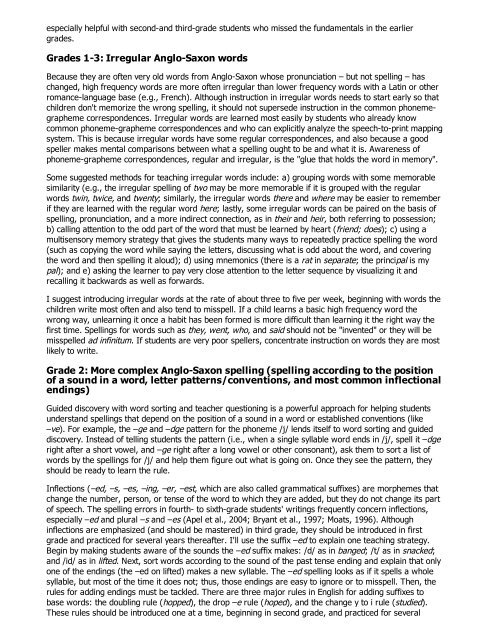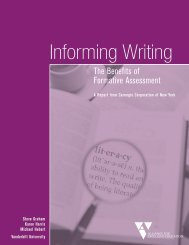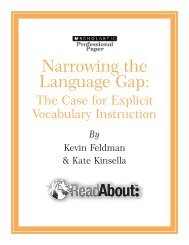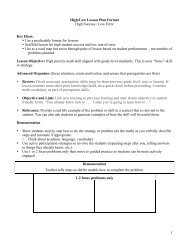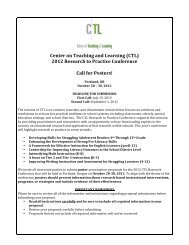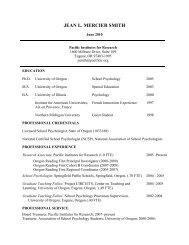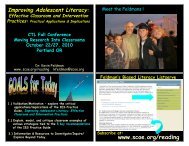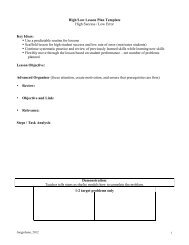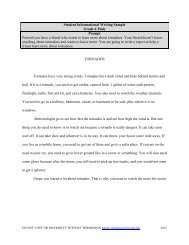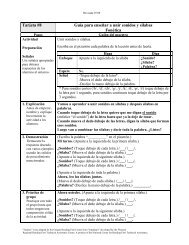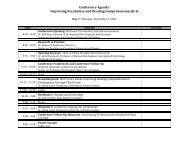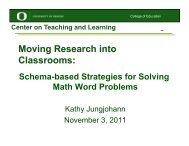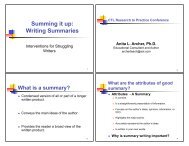How Spelling Supports Reading - Center on Teaching and Learning
How Spelling Supports Reading - Center on Teaching and Learning
How Spelling Supports Reading - Center on Teaching and Learning
Create successful ePaper yourself
Turn your PDF publications into a flip-book with our unique Google optimized e-Paper software.
especially helpful with sec<strong>on</strong>d-<strong>and</strong> third-grade students who missed the fundamentals in the earliergrades.Grades 1-3: Irregular Anglo-Sax<strong>on</strong> wordsBecause they are often very old words from Anglo-Sax<strong>on</strong> whose pr<strong>on</strong>unciati<strong>on</strong> – but not spelling – haschanged, high frequency words are more often irregular than lower frequency words with a Latin or otherromance-language base (e.g., French). Although instructi<strong>on</strong> in irregular words needs to start early so thatchildren d<strong>on</strong>'t memorize the wr<strong>on</strong>g spelling, it should not supersede instructi<strong>on</strong> in the comm<strong>on</strong> ph<strong>on</strong>emegraphemecorresp<strong>on</strong>dences. Irregular words are learned most easily by students who already knowcomm<strong>on</strong> ph<strong>on</strong>eme-grapheme corresp<strong>on</strong>dences <strong>and</strong> who can explicitly analyze the speech-to-print mappingsystem. This is because irregular words have some regular corresp<strong>on</strong>dences, <strong>and</strong> also because a goodspeller makes mental comparis<strong>on</strong>s between what a spelling ought to be <strong>and</strong> what it is. Awareness ofph<strong>on</strong>eme-grapheme corresp<strong>on</strong>dences, regular <strong>and</strong> irregular, is the "glue that holds the word in memory".Some suggested methods for teaching irregular words include: a) grouping words with some memorablesimilarity (e.g., the irregular spelling of two may be more memorable if it is grouped with the regularwords twin, twice, <strong>and</strong> twenty; similarly, the irregular words there <strong>and</strong> where may be easier to rememberif they are learned with the regular word here; lastly, some irregular words can be paired <strong>on</strong> the basis ofspelling, pr<strong>on</strong>unciati<strong>on</strong>, <strong>and</strong> a more indirect c<strong>on</strong>necti<strong>on</strong>, as in their <strong>and</strong> heir, both referring to possessi<strong>on</strong>;b) calling attenti<strong>on</strong> to the odd part of the word that must be learned by heart (friend; does); c) using amultisensory memory strategy that gives the students many ways to repeatedly practice spelling the word(such as copying the word while saying the letters, discussing what is odd about the word, <strong>and</strong> coveringthe word <strong>and</strong> then spelling it aloud); d) using mnem<strong>on</strong>ics (there is a rat in separate; the principal is mypal); <strong>and</strong> e) asking the learner to pay very close attenti<strong>on</strong> to the letter sequence by visualizing it <strong>and</strong>recalling it backwards as well as forwards.I suggest introducing irregular words at the rate of about three to five per week, beginning with words thechildren write most often <strong>and</strong> also tend to misspell. If a child learns a basic high frequency word thewr<strong>on</strong>g way, unlearning it <strong>on</strong>ce a habit has been formed is more difficult than learning it the right way thefirst time. <str<strong>on</strong>g>Spelling</str<strong>on</strong>g>s for words such as they, went, who, <strong>and</strong> said should not be "invented" or they will bemisspelled ad infinitum. If students are very poor spellers, c<strong>on</strong>centrate instructi<strong>on</strong> <strong>on</strong> words they are mostlikely to write.Grade 2: More complex Anglo-Sax<strong>on</strong> spelling (spelling according to the positi<strong>on</strong>of a sound in a word, letter patterns/c<strong>on</strong>venti<strong>on</strong>s, <strong>and</strong> most comm<strong>on</strong> inflecti<strong>on</strong>alendings)Guided discovery with word sorting <strong>and</strong> teacher questi<strong>on</strong>ing is a powerful approach for helping studentsunderst<strong>and</strong> spellings that depend <strong>on</strong> the positi<strong>on</strong> of a sound in a word or established c<strong>on</strong>venti<strong>on</strong>s (like–ve). For example, the –ge <strong>and</strong> –dge pattern for the ph<strong>on</strong>eme /j/ lends itself to word sorting <strong>and</strong> guideddiscovery. Instead of telling students the pattern (i.e., when a single syllable word ends in /j/, spell it –dgeright after a short vowel, <strong>and</strong> –ge right after a l<strong>on</strong>g vowel or other c<strong>on</strong>s<strong>on</strong>ant), ask them to sort a list ofwords by the spellings for /j/ <strong>and</strong> help them figure out what is going <strong>on</strong>. Once they see the pattern, theyshould be ready to learn the rule.Inflecti<strong>on</strong>s (–ed, –s, –es, –ing, –er, –est, which are also called grammatical suffixes) are morphemes thatchange the number, pers<strong>on</strong>, or tense of the word to which they are added, but they do not change its partof speech. The spelling errors in fourth- to sixth-grade students' writings frequently c<strong>on</strong>cern inflecti<strong>on</strong>s,especially –ed <strong>and</strong> plural –s <strong>and</strong> –es (Apel et al., 2004; Bryant et al., 1997; Moats, 1996). Althoughinflecti<strong>on</strong>s are emphasized (<strong>and</strong> should be mastered) in third grade, they should be introduced in firstgrade <strong>and</strong> practiced for several years thereafter. I'll use the suffix –ed to explain <strong>on</strong>e teaching strategy.Begin by making students aware of the sounds the –ed suffix makes: /d/ as in banged; /t/ as in snacked;<strong>and</strong> /id/ as in lifted. Next, sort words according to the sound of the past tense ending <strong>and</strong> explain that <strong>on</strong>ly<strong>on</strong>e of the endings (the –ed <strong>on</strong> lifted) makes a new syllable. The –ed spelling looks as if it spells a wholesyllable, but most of the time it does not; thus, those endings are easy to ignore or to misspell. Then, therules for adding endings must be tackled. There are three major rules in English for adding suffixes tobase words: the doubling rule (hopped), the drop –e rule (hoped), <strong>and</strong> the change y to i rule (studied).These rules should be introduced <strong>on</strong>e at a time, beginning in sec<strong>on</strong>d grade, <strong>and</strong> practiced for several


